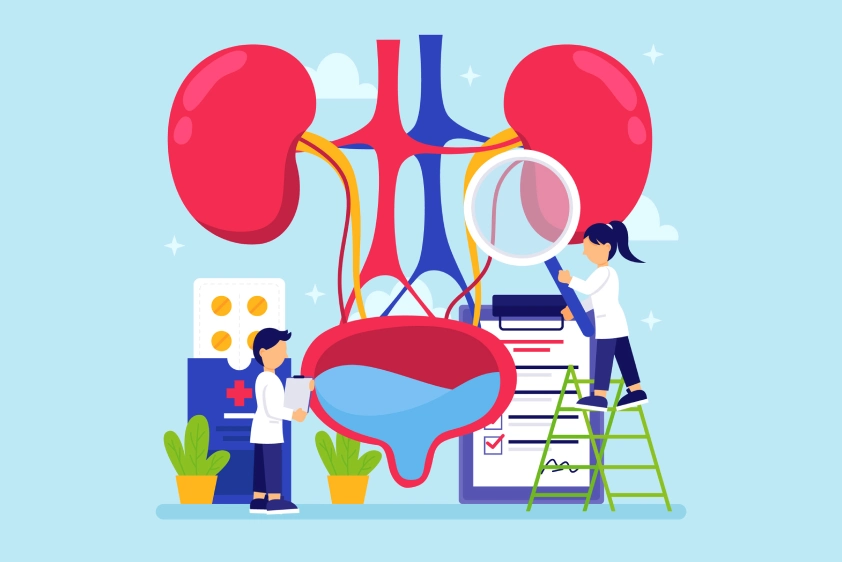Kidney Stones: Causes, Symptoms, Diagnosis & Treatment
Kidney stones are no joke. That sudden, sharp pain in your side or lower back can stop you in your tracks. These tiny, rock-like deposits may be small, but they can cause serious discomfort, leaving you desperate for relief. The good news? There’s a lot we can do to prevent and treat them. In this blog, we’ll explore what causes kidney stones, how to spot the symptoms, how doctors diagnose them, and, most importantly, the treatment options available to help you get back on your feet. Let’s dive in!
Causes of Kidney Stones
Kidney stones develop when certain minerals and salts, like calcium, oxalate, and uric acid, build up and solidify in your urine. One big reason this happens is dehydration—when you don’t stay properly hydrated, your urine becomes concentrated. Without enough fluid to flush out the minerals, they crystallize and stick together, eventually turning into stones.
But dehydration isn’t the only culprit. Your diet can also play a role, especially if you’re eating foods high in oxalates (like spinach or nuts), too much salt, or dealing with obesity or certain digestive issues. Even medical conditions like gout can increase your risk. And unfortunately, if kidney stones run in your family, you might be more prone to them, too. Genetics can play a sneaky part in stone formation, so if your parents or siblings have had kidney stone treatment, staying vigilant is a good idea!
Symptoms of Kidney Stones
The symptoms can be hard to miss when dealing with kidney stones, and they often hit suddenly. Here are the key signs to watch out for:
- Intense pain: This usually starts suddenly and is often felt in your back or side, just below the ribs. The pain can shift to your lower abdomen or groin as the stone moves.
- Pain that moves: As the stone travels through your urinary tract, the pain can move along with it.
- Nausea and vomiting: The pain from a kidney stone can sometimes be so intense that it causes nausea or vomiting.
- Blood in your urine: You might notice your urine turning pink, red, or brown due to blood.
- Frequent or painful urination: You may feel the need to urinate often or have difficulty emptying your bladder.
- Fever and chills: If the kidney stone causes an infection, fever and chills can be warning signs.
If you’re experiencing these symptoms, it’s important to seek treatment as soon as possible to avoid complications.
Kidney Stone Treatment
When it comes to kidney stone treatment, it depends on how big the stone is and how much it’s messing with your life. If you’ve got a small one that isn’t causing too much trouble, your doctor might tell you to drink a ton of water to help it pass naturally. Along with that, taking over-the-counter pain meds can make things a little more bearable while you wait.
But for those larger, more stubborn stones that won’t budge, a kidney disease doctor might recommend something like shock wave lithotripsy, which uses sound waves to break the stones into smaller, passable pieces. If that doesn’t work, surgery could be on the table, or they might try a ureteroscopy—where they use a thin tube to either grab the stone or break it up.
Now, if you’re searching for the best hospital for kidney stone treatment, choose a place known for top-notch urology and nephrology care. A good kidney stone clinic with experienced specialists can make a world of difference in how quickly you recover and how you prevent stones from coming back in the future.
Prevention of Kidney Stones
Once you’ve had a kidney stone, you’ll want to do everything you can to avoid going through that again. However, there are some steps you can take to reduce your risk:
- Stay hydrated: Drink plenty of water. It helps dilute the minerals in your urine that can lead to stone formation.
- Watch your diet: You may need to cut back on foods high in oxalates, like spinach, beets, and nuts. Reducing your salt intake can also help.
- Limit red meat and shellfish: If your stones are caused by uric acid, cutting back on these foods can make a big difference.
- Take preventive medications: Your kidney disease doctor might suggest medications if you’re prone to recurring stones.
Dealing with kidney stones can be tough, but knowing what causes them, recognizing the symptoms, and understanding your treatment options can make managing them much easier. By staying proactive—whether it’s by making a few lifestyle changes, drinking more water, or seeking expert help from the best hospital for kidney stone treatment—you can reduce the risk of future stones and protect your overall kidney health. Taking steps early can make a difference in how you feel, both now and in the long run. Your kidneys will thank you!





